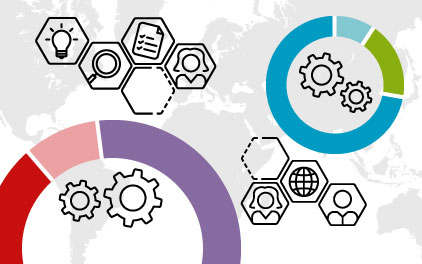
- RENEWABLE ENERGIES AND ENERGY EFFICIENCY
- ENVIRONMENT AND CLIMATE CHANGE
- ECONOMIC DEVELOPMENT AND EMPLOYMENT
- SOCIAL DEVELOPMENT
India
GIZ local staff
National employees: 477
International employees: 58
Integrated experts: 1
(as at: 31.12.2024)
The Deutsche Gesellschaft für Internationale Zusammenarbeit (GIZ) GmbH has been operating in India for over 60 years. It has offices in Delhi, Bengaluru and Mumbai, in addition to other locations in the country.
India is an emerging country with a rapidly growing economy and industry. Most of the country’s energy needs are currently still met by fossil fuels, resulting in high greenhouse gas emissions. At the same time, India is facing the challenge of adapting to the increasingly visible impacts of climate change. Almost one third of its land mass is already affected by desertification and degradation, and groundwater scarcity is a growing problem.
In 2022, India and Germany signed the Green and Sustainable Development Partnership and made a commitment to achieving the goals of the 2030 Agenda and the Paris Agreement.
As the world’s most populous country, India must also cope with the demands of a rapidly growing population. More than 30 per cent of the population already lives in urban areas, and the constant influx is creating challenges for India’s cities. Environmental pollution poses health risks to residents and requires the urban infrastructure to be adapted. In addition, there is a lack of vocational education and steady income opportunities. Many Indians therefore still live below the poverty line.
GIZ works on behalf of the German Government, the European Union (EU), other public and private clients as well as civil society in the following thematic areas:
- Environment, biodiversity and natural resource management
- Sustainable urban and industrial development
- Energy, as well as social and private sector development
In India, GIZ supports communities as well as public and private institutions in conserving natural resources and biodiversity, minimising climate-related risks and restructuring agrifood systems to make them sustainable. This is important in order to secure livelihoods in rural areas without losing sight of environmental aspects.
GIZ works for sustainable urban and industrial development by supporting the development of clean, inclusive, green and resilient urban and industrial areas. There is a focus on integrated river basin management.
To protect the environment, GIZ also provides support to restructure India’s energy sector and reduce emissions. It promotes the expansion of renewable energy and is committed to increasing energy efficiency.
Furthermore, GIZ promotes the socio-economic development in India by promoting cooperation with the private sector, improving vocational education for skilled workers, and advancing fair employment and entrepreneurship. In addition, GIZ provides support to ensure access to social health protection for families and workers in the informal sector, with a particular focus on women.








